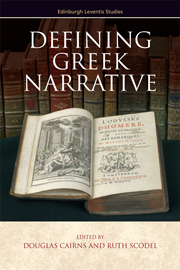Book contents
- Frontmatter
- Contents
- Preface
- Notes on Contributors
- 1 Introduction
- PART I DEFINING THE GREEK TRADITION
- PART II THE DEVELOPMENT OF THE GREEK TRADITION
- PART III BEYOND GREECE
- 14 Livy Reading Polybius: Adapting Greek Narrative to Roman History
- 15 Pamela and Plato: Ancient and Modern Epistolary Narratives
- 16 The Anonymous Traveller in European Literature: A Greek Meme?
- Bibliography
- Index
14 - Livy Reading Polybius: Adapting Greek Narrative to Roman History
from PART III - BEYOND GREECE
Published online by Cambridge University Press: 05 September 2014
- Frontmatter
- Contents
- Preface
- Notes on Contributors
- 1 Introduction
- PART I DEFINING THE GREEK TRADITION
- PART II THE DEVELOPMENT OF THE GREEK TRADITION
- PART III BEYOND GREECE
- 14 Livy Reading Polybius: Adapting Greek Narrative to Roman History
- 15 Pamela and Plato: Ancient and Modern Epistolary Narratives
- 16 The Anonymous Traveller in European Literature: A Greek Meme?
- Bibliography
- Index
Summary
HISTORICAL NARRATIVE AND THE TASK OF THE READER
For as long as I have studied ancient historiography, one aspect in particular has been especially fascinating to me: the continual concern of many authors about their readers and the potential effect their narratives have on them. Or, to be more precise: what am I to do, how am I to write, in order to prevent the reader from becoming bored and – horribile dictu – from putting down the scroll and quitting communication with the author altogether.
Dealing with the reader in antiquity is, needless to say, always tricky, because our knowledge is far from sufficient to take an empirical approach towards these phenomena. One way out consists in the statements ancient historians make about this topic, since we can suppose with some confidence that they have been readers themselves too, at least from time to time. Some of them even try to take the perspective of their own readers, thus creating a kind of implied counterpart, as for instance Livy does in his tenth book:
supersunt etiam nunc Samnitium bella, quae continua per quartum iam volumen annumque sextum et quadragesimum a M. Valerio A. Cornelio consulibus, qui primi Samnio arma intulerunt, agimus; et ne tot annorum clades utriusque gentis laboresque actos nunc referam, quibus nequiuerint tamen dura illa pectora vinci, … [14] tamen bello non abstinebat. adeo ne infeliciter quidem defensae libertatis taedebat et vinci quam non temptare victoriam malebant. quinam sit ille, quem pigeat longinquitatis bellorum scribendo legendoque, quae gerentes non fatigaverunt?
- Type
- Chapter
- Information
- Defining Greek Narrative , pp. 279 - 297Publisher: Edinburgh University PressPrint publication year: 2014



